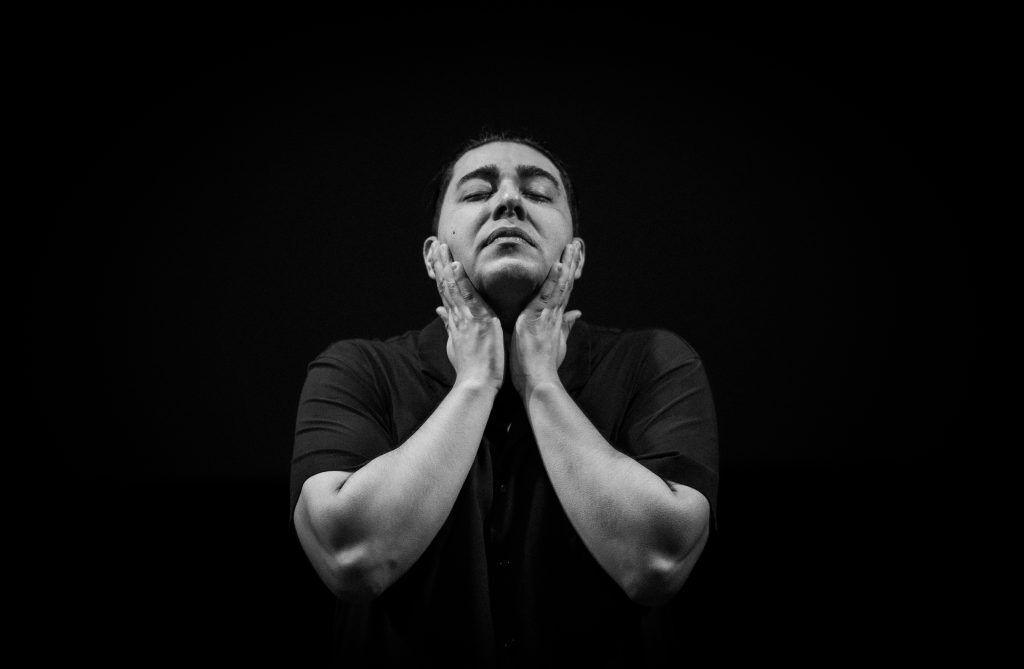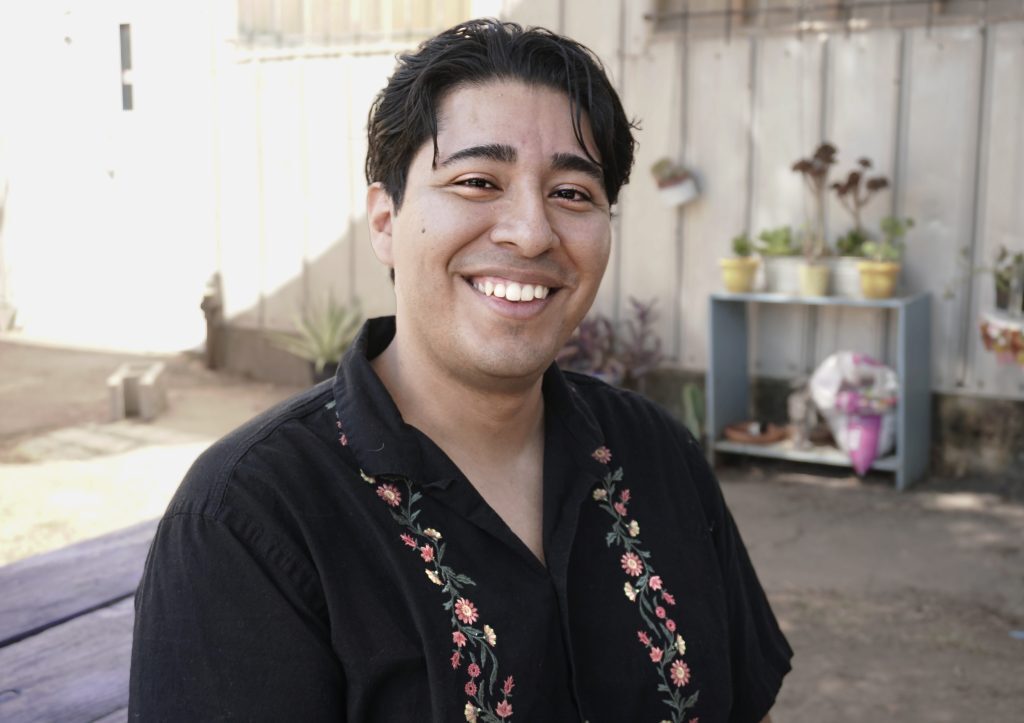Jorge Quintana’s poetry and films are centered on the 28-year-old Sacramento native’s experience as an undocumented immigrant, fused with the artist’s personal philosophy about death, love and the human experience.

Quintana’s artwork won him the 2023 Youth Speaks Individual Artist Fellowship. He has produced four documentary films, including one he co-directed called “City of Altars,” which showcases altars and cultural activities from the Latino Center of Art and Culture’s annual Day of the Dead event in Sacramento. Quintana, who now lives in Elk Grove, is the director of communications for the center.
He also participates in poetry slams, festivals and theatrical performances such as Teatro Nagual’s Cabaret at B Street Theater, The MacBeth Project and Teatro Espejo’s Intercultural Reflections: A Festival of the Arts at California Stage Theater, and the Root Slam in Oakland.
“I am a pioneer of psychedelic, surrealist love poetry,” Quintana says. “Psychedelic surrealism was really born out of me exploring the human spirit, me going through my own spiritual human journey and contemplating. I’m an eternal contemplator.”
Quintana refers to this as “a genre of poetry that uses the Latin American surrealist style to describe the psychedelic experience of existing without a body, or sometimes with too many” — something he feels is akin to being an undocumented immigrant.
Love is also a core part of his work. “The first poem I ever wrote in third grade was for a girl that I really liked. I still remember it to this day: ‘Roses are red, violets are blue, I love flowers, but not as much as you.’ That was the first thing I wrote. And she crumpled it and threw it away, and I saw that happen in front of me,” Quintana says.
Undocumented to published
He also participates in poetry slams, festivals and theatrical performances such as Teatro Nagual’s Cabaret at B Street Theater, The MacBeth Project and Teatro Espejo’s Intercultural Reflections: A Festival of the Arts at California Stage Theater, and the Root Slam in Oakland.
“I am a pioneer of psychedelic, surrealist love poetry,” Quintana says. “Psychedelic surrealism was really born out of me exploring the human spirit, me going through my own spiritual human journey and contemplating. I’m an eternal contemplator.”
Quintana refers to this as “a genre of poetry that uses the Latin American surrealist style to describe the psychedelic experience of existing without a body, or sometimes with too many” — something he feels is akin to being an undocumented immigrant.
Love is also a core part of his work. “The first poem I ever wrote in third grade was for a girl that I really liked. I still remember it to this day: ‘Roses are red, violets are blue, I love flowers, but not as much as you.’ That was the first thing I wrote. And she crumpled it and threw it away, and I saw that happen in front of me,” Quintana says.
Undocumented to published

Born and raised in Sacramento, Quintana attended Sheldon High School and graduated from Sacramento State with bachelor’s degrees in English and ethnic studies. He became interested in filmmaking during college while exploring ways to present his poetry on social media.
With poetry, he was introduced to concepts of rhythm and rhyme through a middle school friend who shared his passion for writing hip-hop music, eventually leading Quintana to perform poetry for the first time as a senior at his high school’s talent show. When he received an unexpected note saying his poem was “quite lovely” from his particularly stern English teacher following his performance, Quintana decided to keep at it.
Quintana’s style has matured and evolved since his early exploration of poetry, often handling complex subjects like death, loss and cultural identity.
Recently published by Harper Perennial in a new anthology, “Here To Stay: Poetry and Prose from the Undocumented Diaspora,” The book was released Sept. 3 and is available at major online retailers including Barnes & Noble, Amazon, Target and Walmart. Quintana’s poem “The poem where ants are immigrants and I am the U.S.” explores these themes by comparing immigrants to invasive ants.
Quintana explained the meaning of the poem. “No. 1, it’s me talking about how much I hate ants. Growing up in a low-income home warring with ants, they’d be all up in our cereals, in our cabinets. The other parallel is kind of me reflecting on that, and seeing if ants were immigrants and I was the United States — if I feel so right to take the life of these beings who were only here for food and shelter, what does that say about me as a human trying to find home in this country that’s doing the same thing to people like me?”
An excerpt of the poem reads:
I remember waiting in line with
my mom to get WIC food stamps
and the new cereals we got to buy
and the ants that noticed
and devoured them before I could
but even then I couldn’t blame the ants
for being tired of our poverty
and rejoicing in something new
Quintana’s poem, “Lunada,” is also featured in the anthology and speaks to the feeling of being disconnected from your heritage.
“There is nothing I can’t swallow whole. I’m afraid of drowning in my own mouth. It’s what I inherited from the men in my family. We are thirsty for land and find echoes of ourselves in the calls of the birds. My body is the origin story of Icarus. My hands are myth. Everything I touch is swallowed by the dirt. And I belong to the soil anyway.
It’s the first thing I inherited from my father. I couldn’t inherit his homeland. His Mexico is a laughter that doesn’t fit inside my diaphragm. I am a man of many voices. They cascade into horizons. They empty me. They set with the sun and call for the moon. They are the gravity at my ankles. The jokes whispered by the wind.”
Quintana notes that his poetry can be complex, “heavy” and difficult to understand for some. That’s why the poem, “Home (The Bird and the Rock),” is one of his favorites he has written and performed. The poem uses metaphor to tackle the difficulty of letting go of a relationship that is no longer good for you.
Quintana says that the last line of the poem, which reads, “He was going somewhere,” adds a hopeful element that makes the heaviness of loss “digestible” for readers.
Preserving memories through story
With poetry, he was introduced to concepts of rhythm and rhyme through a middle school friend who shared his passion for writing hip-hop music, eventually leading Quintana to perform poetry for the first time as a senior at his high school’s talent show. When he received an unexpected note saying his poem was “quite lovely” from his particularly stern English teacher following his performance, Quintana decided to keep at it.
Quintana’s style has matured and evolved since his early exploration of poetry, often handling complex subjects like death, loss and cultural identity.
Recently published by Harper Perennial in a new anthology, “Here To Stay: Poetry and Prose from the Undocumented Diaspora,” The book was released Sept. 3 and is available at major online retailers including Barnes & Noble, Amazon, Target and Walmart. Quintana’s poem “The poem where ants are immigrants and I am the U.S.” explores these themes by comparing immigrants to invasive ants.
Quintana explained the meaning of the poem. “No. 1, it’s me talking about how much I hate ants. Growing up in a low-income home warring with ants, they’d be all up in our cereals, in our cabinets. The other parallel is kind of me reflecting on that, and seeing if ants were immigrants and I was the United States — if I feel so right to take the life of these beings who were only here for food and shelter, what does that say about me as a human trying to find home in this country that’s doing the same thing to people like me?”
An excerpt of the poem reads:
I remember waiting in line with
my mom to get WIC food stamps
and the new cereals we got to buy
and the ants that noticed
and devoured them before I could
but even then I couldn’t blame the ants
for being tired of our poverty
and rejoicing in something new
Quintana’s poem, “Lunada,” is also featured in the anthology and speaks to the feeling of being disconnected from your heritage.
“There is nothing I can’t swallow whole. I’m afraid of drowning in my own mouth. It’s what I inherited from the men in my family. We are thirsty for land and find echoes of ourselves in the calls of the birds. My body is the origin story of Icarus. My hands are myth. Everything I touch is swallowed by the dirt. And I belong to the soil anyway.
It’s the first thing I inherited from my father. I couldn’t inherit his homeland. His Mexico is a laughter that doesn’t fit inside my diaphragm. I am a man of many voices. They cascade into horizons. They empty me. They set with the sun and call for the moon. They are the gravity at my ankles. The jokes whispered by the wind.”
Quintana notes that his poetry can be complex, “heavy” and difficult to understand for some. That’s why the poem, “Home (The Bird and the Rock),” is one of his favorites he has written and performed. The poem uses metaphor to tackle the difficulty of letting go of a relationship that is no longer good for you.
Quintana says that the last line of the poem, which reads, “He was going somewhere,” adds a hopeful element that makes the heaviness of loss “digestible” for readers.
Preserving memories through story

For Quintana, poetry is just one facet of his storytelling. He is also an actor, podcaster and produces and directs artistic and documentary films, including the soon-to-be-released “City of Altars” which he produced, co-directed and edited. The documentary showcases altars and cultural activities from El Panteón de Sacramento, the annual Día de los Muertos celebration hosted by the Latino Center of Art and Culture.
Storytelling is a way for Quintana to preserve memories while bringing attention to the lived experience of the often overlooked and forgotten, memorializing their existence.
“I think ‘story’ is a way of preserving. We have memories, but it’s when you write them down that you can revisit them in the sharpest of details,” Quintana says. “I would say it’s so many things to me, and I guess part of me is — it’s my own way of coming to terms with death and not wanting anyone to go forgotten.”
With his own stories memorialized through poetry alongside some of his literary heroes, Quintana isn’t likely to be forgotten. Quintana applied to be part of the anthology through UndocuPoets, a nonprofit literary project founded in 2015 “to protest the immigration status-based, discriminatory practices of many poetry book contests.”
Quintana said it is “incredibly exciting” to be published in a book, his first besides his own self-published works. “It shows why it’s important to have organizations like UndocuPoets and why it’s important to have organizations and initiatives that make space because no one else will.”
Alma López, board chair at the Latino Center of Art and Culture has worked with Quintana since 2022, and speaks highly of his creativity, passion and commitment.
“His creative approach to storytelling and community empowerment helps strengthen the cultural voice of the Latino Center, making him an asset to the organization and its mission,” López said.
López praised his contributions to the community as an artist, poet, and filmmaker.
She said that Quintana “captures the beauty and complexity of Latino life” while uplifting Latino and Chicano voices through his films, poetry and his work at the center.
For filmmaker Devon Whitaker, who has worked on various film projects with Quintana, the artistry of Quintana’s work is just as important as his community impact.
“Jorge’s approach to filmmaking is unique because he allows the emotion from the script to dictate the environment,” Whitaker said.
He called Quintana a “Jack of all trades” who skillfully takes on various roles including producer, writer, director and camera operator in pursuit of his aim: “to create high art.”
But Quintana has a more down-to-earth outlook on his work.
“I realize everything comes back to [a] story,” Quintana says. “If someone looks at my work, watches something I’ve done, and they feel something, I’ve already succeeded as an artist. If someone remembers any of my work, I’ve succeeded as a human being.”
Storytelling is a way for Quintana to preserve memories while bringing attention to the lived experience of the often overlooked and forgotten, memorializing their existence.
“I think ‘story’ is a way of preserving. We have memories, but it’s when you write them down that you can revisit them in the sharpest of details,” Quintana says. “I would say it’s so many things to me, and I guess part of me is — it’s my own way of coming to terms with death and not wanting anyone to go forgotten.”
With his own stories memorialized through poetry alongside some of his literary heroes, Quintana isn’t likely to be forgotten. Quintana applied to be part of the anthology through UndocuPoets, a nonprofit literary project founded in 2015 “to protest the immigration status-based, discriminatory practices of many poetry book contests.”
Quintana said it is “incredibly exciting” to be published in a book, his first besides his own self-published works. “It shows why it’s important to have organizations like UndocuPoets and why it’s important to have organizations and initiatives that make space because no one else will.”
Alma López, board chair at the Latino Center of Art and Culture has worked with Quintana since 2022, and speaks highly of his creativity, passion and commitment.
“His creative approach to storytelling and community empowerment helps strengthen the cultural voice of the Latino Center, making him an asset to the organization and its mission,” López said.
López praised his contributions to the community as an artist, poet, and filmmaker.
She said that Quintana “captures the beauty and complexity of Latino life” while uplifting Latino and Chicano voices through his films, poetry and his work at the center.
For filmmaker Devon Whitaker, who has worked on various film projects with Quintana, the artistry of Quintana’s work is just as important as his community impact.
“Jorge’s approach to filmmaking is unique because he allows the emotion from the script to dictate the environment,” Whitaker said.
He called Quintana a “Jack of all trades” who skillfully takes on various roles including producer, writer, director and camera operator in pursuit of his aim: “to create high art.”
But Quintana has a more down-to-earth outlook on his work.
“I realize everything comes back to [a] story,” Quintana says. “If someone looks at my work, watches something I’ve done, and they feel something, I’ve already succeeded as an artist. If someone remembers any of my work, I’ve succeeded as a human being.”
This story was funded by the City of Sacramento’s Arts and Creative Economy Journalism Grant to Solving Sacramento. Following our journalism code of ethics and protocols, the city had no editorial influence over this story and no city official reviewed this story before it was published. Our partners include California Groundbreakers, Capital Public Radio, Outword, Russian America Media, Sacramento Business Journal, Sacramento News & Review, Sacramento Observer and Univision 19. Sign up for our “Sac Art Pulse” newsletter here.





